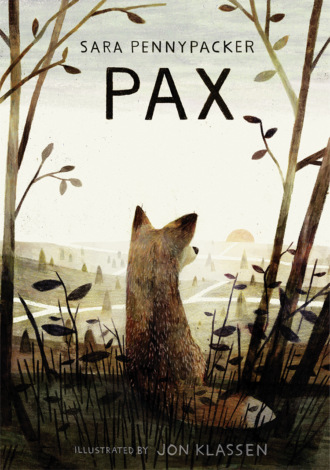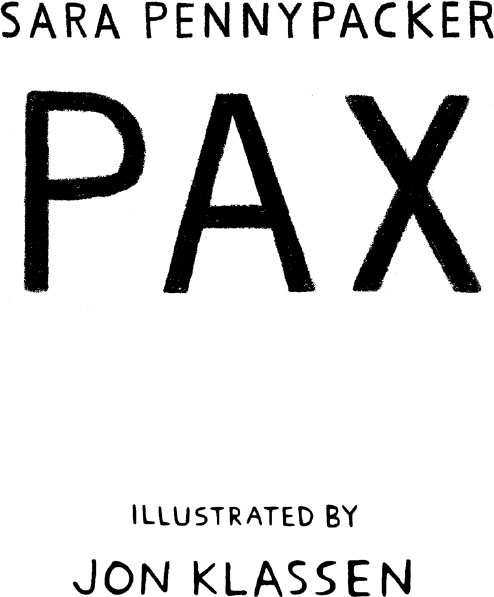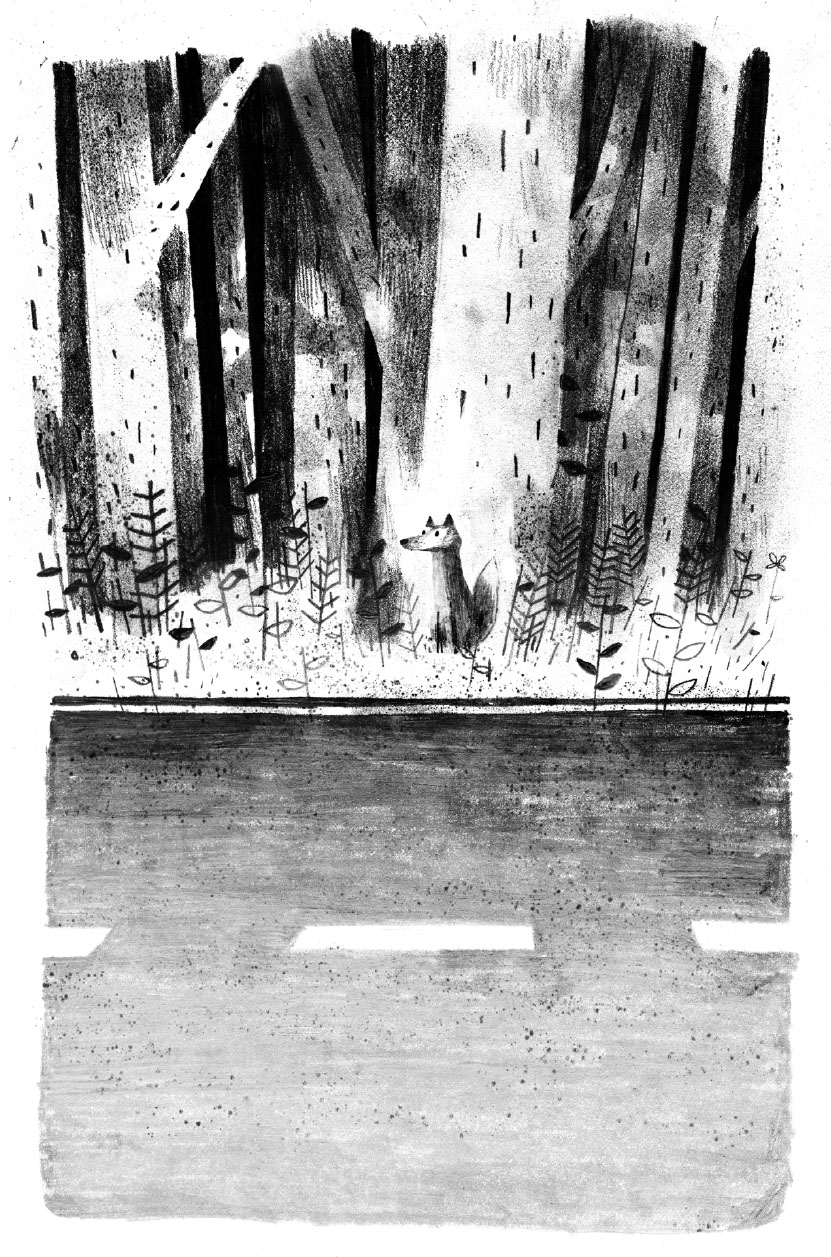
Полная версия
Pax



Copyright
HarperCollins Children’s Books is a division of HarperCollinsPublishers Ltd,
HarperCollins Publishers
1 London Bridge Street
London SE1 9GF
The HarperCollins Children’s Books website address is
www.harpercollins.co.uk
Text copyright © Sara Pennypacker 2016
Illustrations copyright © Jon Klassen 2016
Cover art © 2016 by Jon Klassen
Cover design by Dana Fritts
Sara Pennypacker and Jon Klassen assert the moral right to be identified as the author and illustrator of this work.
A catalogue copy of this book is available from the British Library.
All rights reserved under International and Pan-American Copyright Conventions. By payment of the required fees, you have been granted the non-exclusive, non-transferable right to access and read the text of this e-book on screen. No part of this text may be reproduced, transmitted, down-loaded, decompiled, reverse engineered, or stored in or introduced into any information storage and retrieval system, in any form or by any means, whether electronic or mechanical, now known or hereinafter invented, without the express written permission of HarperCollins.
Source ISBN: 9780008124090
Edition © 2016 ISBN: 9780008158095
Version: 2016-01-31
Author’s note:
Fox communication is a complex system
of vocalization, gesture, scent, and expression.
The “dialogue” in italics in Pax’s chapters attempts
to translate their eloquent language.
To my agent, Steven Malk,
who said “Pax”
– S.P.

Epigraph
Just because it isn’t happening here doesn’t mean it isn’t happening.

Contents
Cover
Title Page
Copyright
Author’s note
Dedication
Epigraph
Chapter 1
Chapter 2
Chapter 3
Chapter 4
Chapter 5
Chapter 6
Chapter 7
Chapter 8
Chapter 9
Chapter 10
Chapter 11
Chapter 12
Chapter 13
Chapter 14
Chapter 15
Chapter 16
Chapter 17
Chapter 18
Chapter 19
Chapter 20
Chapter 21
Chapter 22
Chapter 23
Chapter 24
Chapter 25
Chapter 26
Chapter 27
Chapter 28
Chapter 29
Chapter 30
Chapter 31
Chapter 32
Chapter 33
Chapter 34
Acknowledgments
About the Author
About the Illustrator
Also By Sara Pennypacker
About the Publisher

The fox felt the car slow before the boy did, as he felt everything first. Through the pads of his paws, along his spine, in the sensitive whiskers at his wrists. By the vibrations, he learned also that the road had grown coarser. He stretched up from his boy’s lap and sniffed at threads of scent leaking in through the window, which told him they were now travelling into woodlands. The sharp odours of pine – wood, bark, cones, and needles – slivered through the air like blades, but beneath that, the fox recognised softer clover and wild garlic and ferns, and also a hundred things he had never encountered before but that smelled green and urgent.
The boy sensed something now, too. He pulled his pet back to him and gripped his baseball glove more tightly.
The boy’s anxiety surprised the fox. The few times they had travelled in the car before, the boy had been calm or even excited. The fox nudged his muzzle into the glove’s webbing, although he hated the leather smell. His boy always laughed when he did this. He would close the glove around his pet’s head, play-wrestling, and in this way the fox would distract him.
But today the boy lifted his pet and buried his face in the fox’s white ruff, pressing hard.
It was then that the fox realised his boy was crying. He twisted round to study his face to be sure. Yes, crying – although without a sound, something the fox had never known him to do. The boy hadn’t shed tears for a very long time, but the fox remembered: always before he had cried out, as if to demand that attention be paid to the curious occurrence of salty water streaming from his eyes.
The fox licked at the tears and then grew more con-fused. There was no scent of blood. He squirmed out of the boy’s arms to inspect his human more carefully, alarmed that he could have failed to notice an injury, although his sense of smell was never wrong. No, no blood; not even the under-skin pooling of a bruise or the marrow leak of a cracked bone, which had happened once.
The car pulled to the right, and the suitcase beside them shifted. By its scent, the fox knew it held the boy’s clothing and the things from his room he handled most often: the photo he kept on top of his bureau and the items he hid in the bottom drawer. He pawed at a corner, hoping to pry the suitcase open enough for the boy’s weak nose to smell these favoured things and be comforted. But just then the car slowed again, this time to a rumbling crawl. The boy slumped forward, his head in his hands.
The fox’s heartbeat climbed and the brushy hairs of his tail lifted. The charred metal scent of the father’s new clothing was burning his throat. He leaped to the window and scratched at it. Sometimes at home his boy would raise a similar glass wall if he did this. He always felt better when the glass wall was lifted.
Instead, the boy pulled him down on to his lap again and spoke to his father in a begging tone. The fox had learned the meaning of many human words, and he heard him use one of them now: “NO.” Often the “no” word was linked to one of the two names he knew: his own and his boy’s. He listened carefully, but today it was just the “NO,” pleaded to the father over and over.
The car juddered to a full stop and tilted off to the right, a cloud of dust rising beyond the window. The father reached over the seat again, and after saying something to his son in a soft voice that didn’t match his hard lie-scent, he grasped the fox by the scruff of the neck.
His boy did not resist, so the fox did not resist. He hung limp and vulnerable in the man’s grasp, although he was now frightened enough to nip. He would not displease his humans today. The father opened the car door and strode over gravel and patchy weeds to the edge of a wood. The boy got out and followed.
The father set the fox down, and the fox bounded out of his reach. He locked his gaze on his two humans, surprised to notice that they were nearly the same height now. The boy had grown very tall recently.
The father pointed to the woods. The boy looked at his father for a long moment, his eyes streaming again. And then he dried his face with the neck of his T-shirt and nodded. He reached into his jeans pocket and withdrew an old plastic soldier, the fox’s favorite toy.
The fox came to alert, ready for the familiar game. His boy would throw the toy, and he would track it down – a feat the boy always seemed to find remarkable. He would retrieve the toy and wait with it in his mouth until the boy found him and took it back to toss again.
And sure enough, the boy held the toy soldier aloft and then hurled it into the woods. The fox’s relief – they were only here to play the game! – made him careless. He streaked toward the woods without looking back at his humans. If he had, he would have seen the boy wrench away from his father and cross his arms over his face, and he would have returned. Whatever his boy needed – protection, distraction, affection – he would have offered.
Instead, he set off after the toy. Finding it was slightly more difficult than usual, as there were so many other, fresher odours in the woods. But only slightly – after all, the scent of his boy was also on the toy. That scent he could find anywhere.
The toy soldier lay face down at the burled root of a butternut tree, as if he had pitched himself there in despair. His rifle, its butt pressed tirelessly against his face, was buried to the hilt in leaf litter. The fox nudged the toy free, took it between his teeth, and rose on his haunches to allow his boy to find him.
In the still woods, the only movements were bars of sunlight glinting like green glass through the leafy canopy. He stretched higher. There was no sign of his boy. A prickle of worry shivered up the fox’s spine. He dropped the toy and barked. There was no response. He barked again, and again was answered by only silence. If this was a new game, he did not like it.
He picked up the toy soldier and began to retrace his trail. As he loped out of the woods, a jay streaked in above him, shrieking. The fox froze, torn.
His boy was waiting to play the game. But birds! Hours upon hours he had watched birds from his pen, quivering at the sight of them slicing the sky as recklessly as the lightning he often saw on summer evenings. The freedom of their flights always mesmerised him.
The jay called again, deeper in the forest now, but answered by a chorus of reply. For one more moment the fox hesitated, peering into the trees for another sight of the electric-blue wedge.
And then, behind him, he heard a car door slam shut, and then another. He bounded at full speed, heedless of the briars that tore at his cheeks. The car’s engine roared to life, and the fox skidded to a stop at the edge of the road.
His boy rolled the window down and reached his arms out. And as the car sped away in a pelting spray of gravel, the father cried out the boy’s name, “Peter!” And the boy cried out the only other name the fox knew.
“Pax!”
Конец ознакомительного фрагмента.
Текст предоставлен ООО «ЛитРес».
Прочитайте эту книгу целиком, купив полную легальную версию на ЛитРес.
Безопасно оплатить книгу можно банковской картой Visa, MasterCard, Maestro, со счета мобильного телефона, с платежного терминала, в салоне МТС или Связной, через PayPal, WebMoney, Яндекс.Деньги, QIWI Кошелек, бонусными картами или другим удобным Вам способом.


